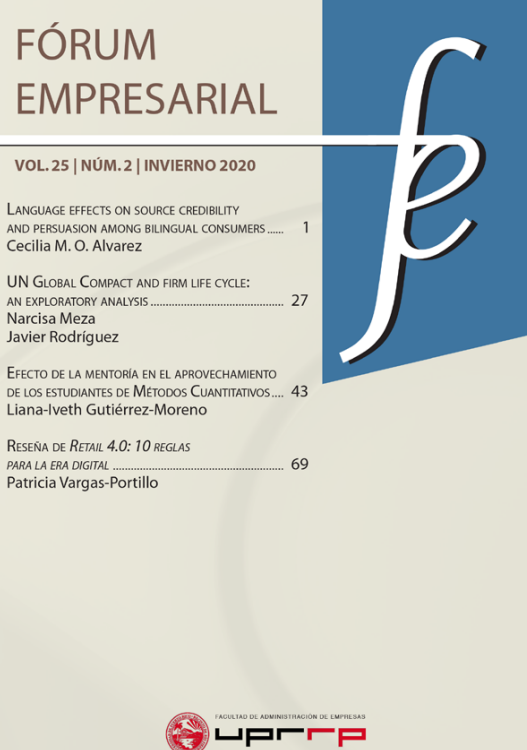Resumen
Esta investigación examina los efectos del lenguaje e identificación con la cultura estadounidense sobre la credibilidad de la fuente de información y persuasión entre hispanos bilingües. Los resultados revelaron que participantes que no se identifican con la cultura estadounidense perciben que la fuente tiene más experiencia, y las actitudes son más positivas hacia las marcas anunciadas en inglés comparadas con marcas anunciadas en español. La experiencia de la fuente y las actitudes no variaron entre participantes que se identifican altamente con la cultura estadounidense. Las fuentes de información que mezclan los dos idiomas fueron percibidas menos expertas y las actitudes fueron menos favorables en comparación con fuentes que usan inglés o español. No se reportan efectos significativos para la confiabilidad y el atractivo de la fuente.
Citas
Alvarez, C. M. O., Dickson, P. R., & Hunter, G. K. (2014). The four faces of the Hispanic consumer: an acculturation-based segmentation. Journal of Business Research, 67(2), 108–115. https://doi.org/10.1016/j.jbusres.2012.11.010
Alvarez, C. M. O., Miniard, P. W., & Jaccard, J. (2017a). How Hispanic bilinguals‘ cultural stereotypes shape advertising persuasiveness. Journal of Business Research, 75, 29–36. https://doi.org/10.1016/j.jbusres.2017.02.003
Alvarez, C. M. O., Uribe, R., & Leon De-la-Torre, R. (2017b). Should I say it in English? Exploring language effects on print advertising among Latin American bilinguals. International Journal of Advertising, 36(6), 975–993. https://doi.org/10.1080/02650487.2017.1401518
Amos, C., Holmes, G., & Strutton, D. (2008). Exploring the relationship between celebrity endorser effects and advertising effectiveness: a quantitative synthesis of effect size. International Journal of Advertising, 27(2), 209–234. https://doi.org/10.1080/02650487.2008.11073052
Badiola, L., Delgado, R., Sande, A., & Stefanich, S. (2018). Codeswitching attitudes and their effects on acceptability judgment tasks. Linguistic Approaches to Bilingualism, 8(1), 5–24. https://doi.org/10.1075/lab.16006.bad
Bergkvist, L., & Zhou, K. Q. (2016). Celebrity endorsements: a literature review and research agenda. International Journal of Advertising, 35(4), 642–663. https://doi.org/10.1080/02650487.2015.1137537
Choi, S. M., & Rifon, N. J. (2012). It is a match: the impact of congruence between celebrity image and consumer ideal self on endorsement effectiveness. Psychology & Marketing, 29(9), 639–650. https://doi.org/10.1002/mar.20550
Deshpande, R., Hoyer, W. D., & Donthu, N. (1986). The intensity of ethnic affiliation: a study of the sociology of Hispanic consumption. Journal of Consumer Research, 13(2), 214–220. https://doi.org/10.1086/209061
Feldman, J. M., & Lynch, J. G. (1988). Self-generated validity and other effects of measurement on belief, attitude, intention, and behavior. Journal of Applied Psychology, 73(3), 421–435. https://doi.org/10.1037/0021-9010.73.3.421
Gerritsen, M., Nickerson, C., Van Hooft, A., Van Meurs, F., Korzilius, H., Nederstigt, U., Starren, M., & Crijns, R. (2010). English in product advertisements in non-English speaking countries in western Europe: product image and comprehension of the text. Journal of Global Marketing, 23(4), 349– 365. https://doi.org/10.1080/08911762.2010.504523
Grosjean, F. (1982). Life with two languages: an introduction to bilingualism. Harvard University Press.
Grosjean, F. (2010). Bilingual: life and reality. Harvard University Press.
Hornikx, J., van Meurs, F., & de Boer, A. (2010). English or a local language in advertising?: The appreciation of easy and difficult English slogans in the Netherlands. The Journal of Business Communication, 47(2), 169–188. https://doi.org/10.1177/0021943610364524
Koslow, S., Shamdasani, P. N., & Touchstone, E. E. (1994). Exploring language effects in ethnic advertising: a sociolinguistic perspective. Journal of Consumer Research, 20(4), 575–585. https://doi.org/10.1086/209371
Lalwani, A. K., Lwin, M., & Li, K. L. (2005). Consumer responses to English accent variations in advertising. Journal of Global Marketing, 18(3), 143-165. https://doi.org/10.1300/J042v18n03_07
Lambert, W. W., & Lambert, W. E. (1973). Social Psychology (Foundations of modern psychology series) (2nd ed.). Prentice Hall.
Lin, Y. C., & Wang, K. Y. (2016). Language choice in advertising for multinational corporations and local firms: a reinquiry focusing on monolinguals. Journal of Advertising, 45(1), 43–52. https://doi.org/10.1080/00913367.2015.1085817
Lin, Y. C., Wang, K. Y., & Hsieh, J.Y. (2017). Creating an effective code-switched ad for monolinguals: the influence of brand origin and foreign language familiarity. International Journal of Advertising, 36(4), 613–631. https://doi.org/10.1080/02650487.2016.1195054
Lord, K. R., Putrevu, S., & Collins, A. F. (2019). Ethnic influences on attractiveness and trustworthiness perceptions of celebrity endorsers. International Journal of Advertising, 38(3), 489–505. https://doi.org/10.1080/02650487.2018.1548196
Lou, C., & Yuan, S. (2019). Influencer marketing: how message value and credibility affect consumer trust of branded content on social media. Journal of Interactive Advertising, 19(1), 58–73. https://doi.org/10.1080/15252019.2018.1533501
Luna, D., & Peracchio, L. A. (2005). Sociolinguistic effects on code-switched ads targeting bilingual consumers. Journal of Advertising, 34(2), 43–56. https://doi.org/10.1080/00913367.2005.10639196
Madadi, R., Torres, I. M., Fazli-Salehi, R., & Zúñiga, M. A. (2020). The impact of Hispanic-targeted advertising on consumers‘ brand love in services. Journal of International Consumer Marketing, 33(2), 137–159. https://doi.org/10.1080/08961530.2020.1767527
McCracken, G. (1989). Who is the celebrity endorser? Cultural foundations of the endorsement process. Journal of Consumer Research, 16(3), 310–321. https://doi.org/10.1086/209217
Montes-Alcalá, C. (2000). Attitudes towards oral and written codeswitching in Spanish-English bilingual youths. In A. Roca (Ed.), Research on Spanish in the U.S. (pp. 218-227). Cascadilla Press.
Ohanian, R. (1990). Construction and validation of a scale to measure celebrity spokespersons‘ perceived expertise, trustworthiness, and attractiveness. Journal of Advertisement, 19(3), 39–52. https://doi.org/10.1080/00913367.1990.10673191
Ohanian, R. (1991). The impact of celebrity spokespersons‘ perceived image on consumers‘ intention to purchase. Journal of Advertising Research, 31(1), 46–54.
Oyserman, D., Lewis, N. A. Jr, Yan, V. X., Fisher, O., O‘Donnell, S. C., & Horowitz, E. (2017). An identity-based motivation framework for self-regulation. Psychological Inquiry, 28(2-3), 139–147. https://doi.org/10.1080/1047840X.2017.1337406
Pagani, M., Goldsmith, R., & Perracchio A. (2015). Standardization vs. adaptation: consumer reaction to TV ads containing subtitled or English dubbed ads. International Journal of Advertising, 34(4), 702–714. https://doi.org/10.1080/02650487.2015.1009349
Reed II, A., Forehand, M. R., Puntoni, S., & Warlop, L. (2012). Identity-based consumer behavior. International Journal of Research in Marketing, 29(4), 310–321. http://dx.doi.org/10.1016/j.ijresmar.2012.08.002
Rossiter, J. R., & Smidts, A. (2012). Print advertising: celebrity presenters. Journal of Business Research, 65(6), 874–879. https://doi.org/10.1016/j.jbusres.2011.01.010
Stuart, E. W., Shimp, T. A., & Engle, R. (1987). Classical conditioning of consumer attitudes: four experiments in an advertising context. Journal of Consumer Research, 14(3), 334–49. https://doi.org/10.1086/209117

Esta obra está bajo una licencia internacional Creative Commons Atribución-NoComercial-CompartirIgual 4.0.
Derechos de autor 2020 Fórum Empresarial

